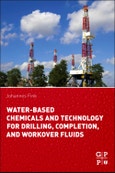Oil and gas engineers today use three main factors in deciding drilling fluids: cost, performance, and environmental impact, making water-based products a much more attractive option. Water-Based Chemicals and Technology for Drilling, Completion, and Workover Fluids effectively delivers all the background and infrastructure needed for an oil and gas engineer to utilize more water-based products that benefit the whole spectrum of the well's life cycle. Helping to mitigate critical well issues such as formation damage, fluid loss control, and borehole repair, more operators demand to know the full selection of water-based products available to consistently keep a peak well performance. This must-have training guide provides the necessary coverage in the area, broken down by type and use, along with an extensive list of supportive materials such as a chemical index of structural formulas and helpful list of references for further reading. In addition to understanding the types, special additives, and chemical compatibilities of the products available, the reader will also learn proper waste disposal techniques, including management of produced water, a component mandatory to hydraulic fracturing operations. Concise and comprehensive, Water-Based Chemicals and Technology for Drilling, Completion, and Workover Fluids details all the necessary educational content and handy references to elevate your well's performance while lowering your environmental impact.
Please Note: This is an On Demand product, delivery may take up to 11 working days after payment has been received.
Table of Contents
Part I: General Aspects 1: History 2: Fields of Application for Water-Based Compositions
Part II: Drilling Fluids 1: Classification of Muds 2: Types of Water-Based Drilling Fluids 3: Special Additives for Drilling Fluids 4: Special Issues of Water-Based Drilling Fluids
Part III: Fracturing Fluids 1: Comparison of Stimulation Techniques 2: Special Types 3: Special Additives for Fracturing Fluids 4: Special Issues of Water-Based Drilling Fluids
Part IV: Other Water-Based Uses 1: Completion and Workover Operations 2: Borehole Repair 3: Cementing 4: Filter Cake Removal 5: Naturally Fractured Carbonate Reservoir Treatment 6: Water Shutoff 7: Sweep Fluids 8: Water-Based Enhanced Oil Recovery 9: Pipelines
Part V: Additives for General Uses 1: Water Soluable Polymers 2: Corrosion Inhibitors 3: Bacteria Control 4: Antifreeze Agents 5: Thickeners 6: Surfactants 7: Lubricants 8: Foams 9: Gelling Water-Based Systems 10: Scale Inhibitors for Squeezing Operations 11: Multifunctional Additives
Part VI-Environmental Aspects and Waste Disposal 1: Environmental Regulations 2: Toxicity Tests 3: Pollutants 4: Use of Waste Byproducts as Additives 5: Waste Streams 6: Discharge of Waste Fluids in Cement 7: Discharge in Polymers 8: Water-Based Drilling Fluid Disposal 9: Drill Cutting Wastes 10: Management of Produced Water 11: Oil-Polluted Ground








